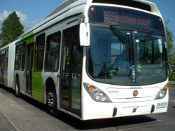Know Before You Go
Transportation
Getting around Chile is very easy and you have many options for transportation.
Renting a car and driving is generally easy. Most roads are in good shape and well marked, but some smaller roads in the neighborhoods can be severely worn down and caution must be taken when navigating them. Like most cities, traffic can become very congested during rush hour. Also, the Chilean drivers tend to be aggressive, though they are also very respectful of crosswalks and stop signs. The traffic rules are almost exactly the same as those of the United States and the police will generally respect American drivers licenses (though it is recommend that one get an international license). Finally, special care should be taken around buses due to their frequent stops and lane changes.
You can also use taxis to get around. Taxis can usually be flagged down at any hour and provide quick and efficient service. Their rates are also very reasonable and the vehicles are generally very clean and well maintained. It is not normal to tip the taxi driver, though you may round up your fare for convenience.
The public transportation system in Chile is efficient, timely and clean. Most cities have a bus system that will get you quickly and cheaply to your destination. In Santiago the buses are equipped with the “BIP” system. To ride the bus you must purchase a BIP card and charge it with money. When you board the bus you simply tap your card over a sensor which then deducts money from you card's account. You are allowed to make three transfers within two hours without having to pay again, which is necessary because the city is so large that you often have to take more than one bus to get to your destination. Santiago also has a train/subway system called the Metro. The metro also works with the BIP system and provides one of the quickest ways to get around. But, during rush hour, the trains can become very crowded. All trains are cleaned and sanitized daily and all graffiti is removed immediately. The buses are also generally clean and graffiti free, but there are also many older buses that show more signs of wear.
For transportation between cities you can take tour buses, ride the train, or take an airplane. Or you can drive one of the many toll roads.
Security and Accommodations
The Chilean police are a friendly and efficient law force. The emergency number to contact the police is 133. Generally Chile is safe, but like most places one should also take a few precautions, such as avoiding bad neighborhoods. Also, don't leave personal items unattended in public places.
Chile offers many types of accommodations including several five star hotels. Generally, the hotels are reasonably priced and offer many amenities, such as breakfast and free Internet access.
Misc.
If you go you should be prepared to pay the $120.00 airport tax. This is charged to all non-Chileans who arrive by plane. Luckily you don't have to pay this fee again until your passport expires. Also, don't bring any non-processed food items with you because customs will take them. This is because agriculture is such a big part of their economy that they don't want their crops to be damaged by a disease or insect that might be brought in from outside.
If you plan to bring any electronic devices you will need an adapter for the plugs. Also, due to the fact that the electrical voltage is 220 volts, you may also need a transformer.


 Back To Top
Back To Top